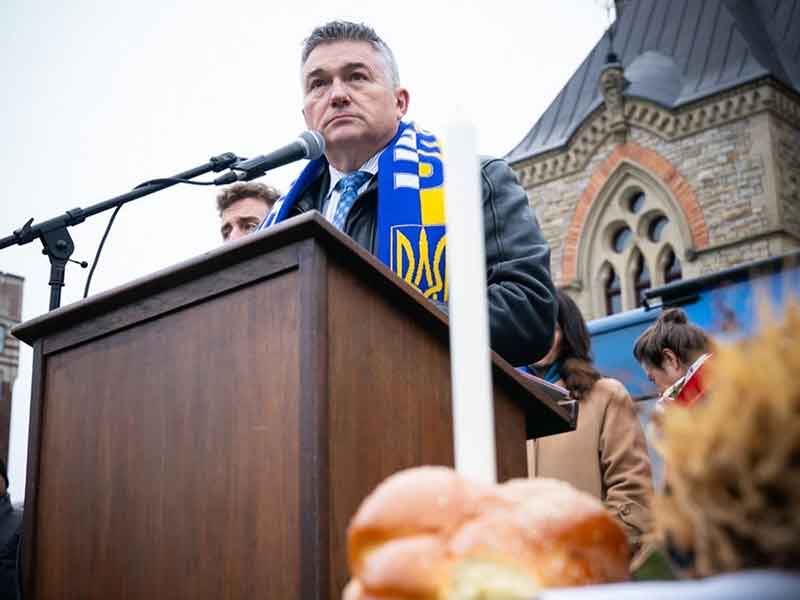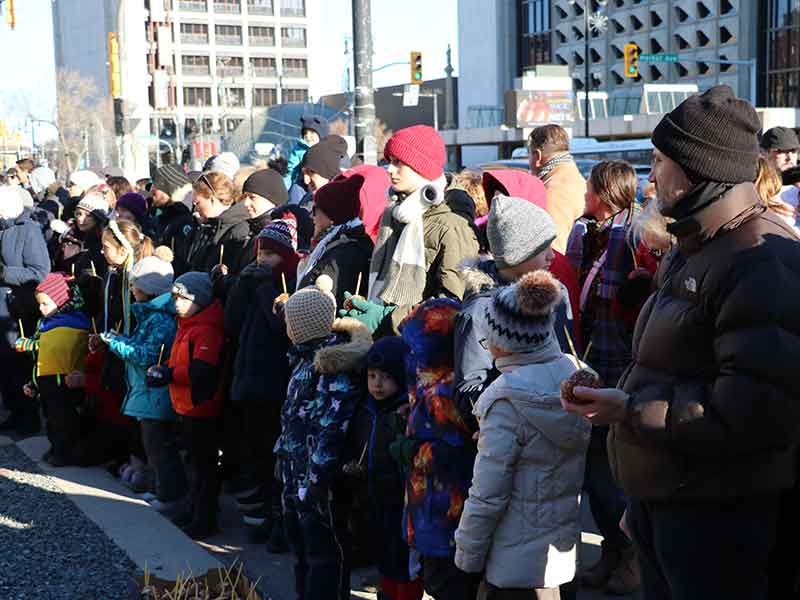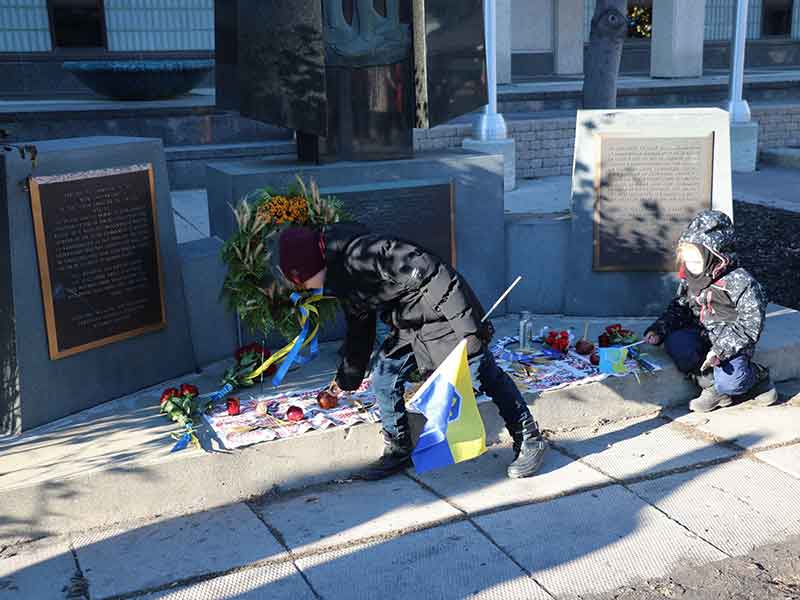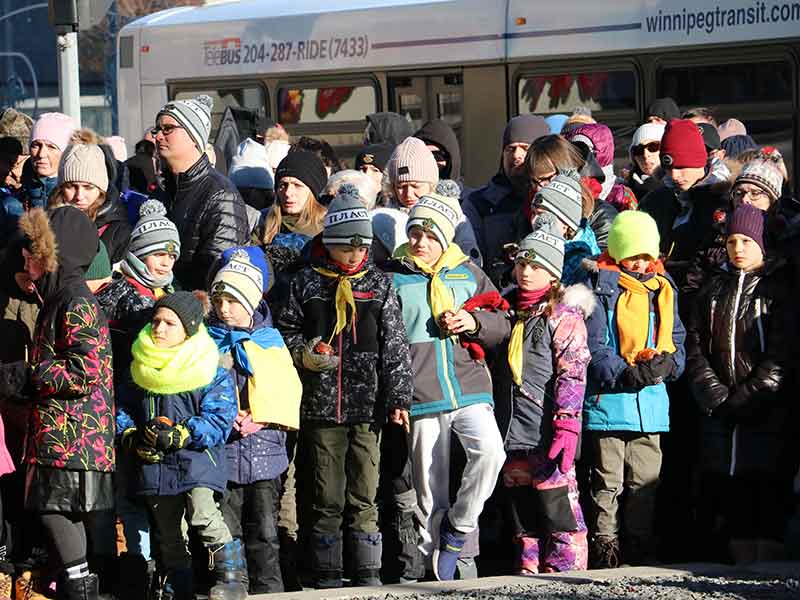Honouring the victims
As Ukrainian Canadians and supporters of Ukraine gathered in numerous cities across Canada last Saturday to pay tribute to the millions of victims of the Holodomor under the Soviet regime of the 1930s, Russia launched a sustained drone attack that could represent the start of a winter campaign to destroy Ukraine’s energy infrastructure.
Russia launched a large-scale invasion of Ukraine on Feb. 24, 2022, and the country subsequently sustained significant damage to its energy infrastructure, which left millions of Ukrainians without power last winter.
Selkirk-Interlake-Eastman MP James Bezan, who attended Holodomor memorials in Ottawa and Winnipeg to mark its 90th anniversary and commemorate the victims, told the Express that Russia’s invasion of Ukraine – starting with Crimea in 2014 – has parallels to the deliberate starvation and attempts to Russify Ukrainians in 1932 and 1933.
“The Soviets weaponized food in 1932. They went into every Ukrainian home and took all the food from their pantries, their canned goods and their produce. They went to farms and took crops and livestock and shipped those to Russia to pay for the Soviet war machine. Then they sat there and watched several million people slowly starve to death,” said Bezan by phone last Friday.
“We know from records acquired after the fall of the Soviet empire – before [Vladimir] Putin came to power – there were statements Stalin made that people need to remember in the modern context and on the 90th anniversary of Holodomor. Stalin said the death of one man is a tragedy; the death of millions is a statistic. Secondly, he said they had to rid themselves of the little Russians, meaning the Ukrainians, and to Russify Ukrainians.”
Holodomor means death by hunger, and various estimates of the deaths range from 3.5 to 10 million people.
The Union of Soviet Socialist Republics (USSR) was formed in 1922. Ten years later millions of Ukrainians and other ethnic groups were systematically starved to death after Joseph Stalin came to power and implemented a series of five-year plans to transform the Soviet Union. The plans included collectivizing agriculture and building up arms. Rural people were divested of their land and livestock and forced to join large state-run collective farms.
Russia’s invasion of Ukraine, which was in its 640th day last Saturday, has included attacks on agriculture, with the destruction or damage of grain storage silos, farmland, farm equipment and food warehouses. Those attacks have undermined food security and nutrition in Ukraine and reduced farmers’ income. Russia has also attacked or blocked ports used to export Ukraine’s grain to other countries, including food-insecure countries in Africa.
Bezan said Putin has taken a page out of the Soviets’ book by weaponizing food and trying to force Russian language, culture and ideology upon a democratic and sovereign nation.
And it’s important to commemorate those who died under Stalin’s genocide – Canada officially recognizes Holodomor as a genocide after Bezan brought a private member’s bill forward 15 years ago – and remind people that the fight for Ukraine’s freedom as a country continues.
“Every year it’s important to commemorate one of the worst genocides in the history of the world where over 7 million Ukrainians, as well as other ethnicities, were purposely targeted by Joseph Stalin and the Soviet regime to destroy Ukrainian’s national identity,” said Bezan, whose grandparents came from the Bukovina region of Ukraine.
When he was in Ukraine in August, Bezan said he visited areas that had been formerly occupied by the Russians and found that even Russian-speaking Ukrainians were “patriotic Ukrainians who all hate Putin.”
As Ukraine continues its counteroffensive in eastern Ukraine, forcing Russia’s Black Sea fleet to the eastern part of the peninsula and pushing towards Crimea, the need for military support from its allies also continues, said Bezan. He recently met with members of Ukraine’s parliament, who expressed concern about the approaching winter and anticipation of further action from Moscow to disrupt the country’s energy infrastructure – a fear that materialized Nov. 25 with Russia’s large drone attack on Ukraine’s capital, Kyiv.
Although Canada’s federal Conservatives support everything the government has done for Ukraine so far, he said, they believe Canada can do more.
“Ukraine is very concerned [about winter] and needs a continued supply of military aid and support to continue to fight this war. We know there’s an ongoing challenge of getting enough munitions. Canada only produces 3,000 rounds of artillery shells for Howitzer triple sevens every month. Ukraine burns through that in a day; they’re using 5,000-6,000 shells a day. All our allies are running out of ammo and can’t produce enough. But we need to step up our game,” said Bezan. “And we definitely need to send over more of our surplus equipment that we don’t need. We have armoured personnel carriers and armoured ambulances that would keep Ukrainian personnel safe.”
Finland recently joined NATO and Sweden is expected to join the alliance in 2024, but Ukraine has yet to be approved for membership.
“We’ve [federal Conservatives] been advocating for Ukraine’s membership in NATO since the time of Stephen Harper’s government. The Trudeau government also supports Ukraine’s membership. Finland, Latvia, Estonia, Lithuania and Poland all support Ukraine’s immediate membership in NATO,” said Bezan. “They problem is the United States and other western European nations are apprehensive about that because as soon as Ukraine becomes a member of NATO, then Article 5 is triggered [an attack on one member state is an attack on all] and you’re into a full-scale war between NATO and Russia.”
Ukraine is in the process of joining the European Union, he added, and that will be “an amazing accomplishment, which could happen as early as the first six months of 2024.”
Canada’s prime minister Justin Trudeau issued a statement on Nov. 25 to commemorate the 90th anniversary of Holodomor, saying the Soviet regime tried to cover up evidence of the mass starvation and that Russia still denies it was a genocide.
“In 1932 and 1933, Joseph Stalin’s Soviet regime inflicted a deliberate famine across Ukraine. The Holodomor – death by hunger – was a genocide that resulted in the starvation of millions of innocent Ukrainians, including children. The Soviet regime also arrested, deported and executed Ukrainians,” said Trudeau. “Stalin perpetrated the Holodomor in an attempt to repress the will of the Ukrainian people, erase their identify and destroy their aspirations for a free and independent Ukraine.”
The prime minister reiterated Canada’s commitment to stand with Ukrainians as they defend their country.
As for any negotiations between Ukraine and Russia to end the conflict, Bezan said members of Ukraine’s government are under no illusion that all wars end at the negotiation table with signed documents. But even so, Russia’s signature may be worth nothing.
“We’re not there yet; neither Russia nor Ukraine wants to talk. It’s not until one or the other feels it’s a draw, and that they have the upper hand, that they’ll sit down at the table to negotiate,” said Bezan. “My concern about this – and I think this is Ukraine’s concern as well – is that a piece of paper signed by the Russian Federation, particularly by Vladimir Putin, means nothing based on past violations of agreements Putin had signed and which promised Ukraine territorial integrity, peace and security. Nobody trusts Putin and nobody trusts that any piece of paper signed with the Russian Federation is going to be honoured for very long.”
Express Photos by Patricia Barrett



